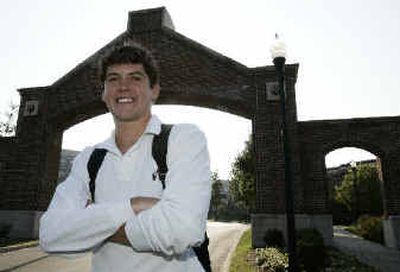Major decision gets trickier

NEW YORK — It’s a well-worn pickup line at college keg parties: What’s your major?
And in today’s uncertain job market, it’s a lot more. Positions once filled by graduates with yesterday’s hot majors are disappearing or being shipped overseas, so a student’s answer to the question is one of the most important financial decisions they will ever make.
Research by professors at Northeastern University in Boston shows that a college student’s major is more important than what college they attend in determining their starting salary upon graduation.
Yet with employment patterns shifting much faster than in the past, choosing a major based on what jobs will be in demand a few years down the road is a tricky endeavor.
“In the last three years, because of the economic recession, the labor market hasn’t really signaled what I ought to be studying in college,” said economist Paul Harrington, the lead author of the Northeastern study. With neither wages nor the job market really growing much, “it’s hard to figure out in the short run what’s going to work for me, what my major should be.”
The most obvious recent trend is a retreat from computer science studies, which was a hot area in the 1990s before the tech bubble burst and companies began offshoring programmers’ jobs.
What emerged as one substitute is actually one of the older — and decidedly unexciting — standbys: accounting.
Last year the number of students graduating with accounting degrees rose 11 percent, according to a survey by the American Institute of Certified Public Accountants.
Colleges are crediting the bean-counter boom on the recent corporate scandals and the Sarbanes-Oxley legislation, both of which put a spotlight on proper bookkeeping.
And at a time when Donald Trump is a poster boy for reality TV, entrepreneurship has become a popular major. A 1970 survey found only 16 college courses on the topic, according to Maria Anton, executive editor of Entrepreneur magazine. Last year, 825 colleges offered entrepreneurship classes, she said.
The University of Dayton, for example, this year has 101 students concentrating in entrepreneurship, the most since it introduced the curriculum in 1999.
“I think they’re seeing their parents and relatives either lose jobs or become what’s being called underemployed,” said Robert Chelle, director of the Ohio college’s Center for Entrepreneurial Leadership. “We’re experiencing a very confident kind of student who wants to take charge of their own destiny.”
Dayton junior Rob Vanderheyden, a double-major in finance and entrepreneurship, wants to first get a corporate job, so he can “learn some real-life stuff before I go out on my own.”
Majors in computer security and health-care fields are also popular, educators say, with jobs battling computer viruses and taking care of aging baby boomers expected to remain in demand in coming years.
Steven Rothberg, president of Minneapolis-based CollegeRecruiter.com, recommends students first consider their competencies, interests and values.
“Notice that compensation is not one of the factors. Notice that employment rate is not one,” Rothberg said. “If they focus on what they’re good at, what they like to do, and what’s important to them, there’s an excellent chance that they will end up in a job upon graduation that will make them happy.”
Plus, a student’s major often has nothing to with their eventual career, causing many to recommend that students with no clear career ambitions choose broadly focused majors.
“What the pundits are telling us is that most of our students who are graduating now are likely to have either second or third careers in 10 to 15 years,” said Andrew Flagel, dean of admissions at George Mason University. “They need sufficient educational grounding so they have the opportunity to make those shifts.”
For some, the economic ups and downs and recent corporate scandals have influenced their choice of majors. When Bobby Cupp started college at the University of California-Berkley in 2001, he recalls, “it seemed that a career in software was a safe bet, the path that would guarantee wealth, even if it wasn’t all that interesting. Nowadays, it’s hard to see what the safe bet would be.”